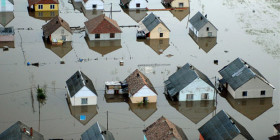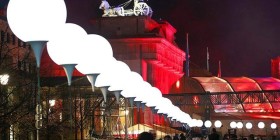Celebrations are being held in Germany to mark the 25th anniversary of the fall of the Berlin Wall.
Concerts and exhibitions are being staged in the city and Chancellor Angela Merkel will later attend a huge open-air party at the Brandenburg Gate.
White balloons marking a stretch of the wall will be released to symbolise its disappearance.
The Berlin Wall was built in 1961 to stop people fleeing from Communist East Germany to the West.
Its fall in 1989 became a powerful symbol of the end of the Cold War.
Chancellor Merkel will be joined for the festivities by former Polish trade union leader Lech Walesa and Mikhail Gorbachev, the last Soviet leader.
The wall stretched for 155km (96 miles) through Berlin but today only about three kilometres of it still stands.
Within a year of its collapse, Germany – divided after its defeat in World War Two – was reunited.
More than a million visitors have descended on Berlin for the weekend of festivities that will culminate later on Sunday at the Brandenburg Gate.
The monument itself was inaccessible during the partition of Germany and is seen as a symbol of the country’s reunification.
On Saturday, people posed for photos in front of the few remaining graffiti-daubed slabs of the wall, or read information boards about life under Berlin’s 28-year division.
Others admired the art installation of almost 7,000 white balloons, pegged to the ground and winding along a 15km (nine miles) stretch of the wall’s route.
At the bustling Potsdamer Platz, which was once cut in two by the wall, a small crowd watched archive footage of East German demonstrators chanting: “We are the people.”
Geraldine Bray, 68, visiting from the UK, said the memory of 9 November 1989 had stayed with her.
“I was at home making the evening meal and put on the news. It was very, very memorable,” she said.
Striking a more sombre note, Mr Gorbachev, 83, warned on Saturday that the world was on the brink of a new Cold War.
Tensions between the West and Russia have been raised by the crisis in Ukraine, which was part of the Soviet Union.
“Bloodshed in Europe and the Middle East against the backdrop of a breakdown in dialogue between the major powers is of enormous concern,” he said.
“The world is on the brink of a new Cold War. Some are even saying that it’s already begun.”
Mr Gorbachev said that the West – in particular the US – had succumbed to “triumphalism” after the collapse of the USSR in 1991.
For this reason the global powers had been unable to cope with conflicts in Yugoslavia, the Middle East and now Ukraine, he added.
Mr Gorbachev, as leader of the USSR in the late 1980s, is credited with rapprochement with the West and creating a more liberal atmosphere which led to the collapse of communist regimes in Eastern Europe in 1989.
Russia has denied fomenting trouble in eastern Ukraine where pro-Russia separatists seized control in the regions of Donetsk and Luhansk in April.
More than 4,000 people have died in the fighting.
A fragile ceasefire has been in place since September, but elections in rebel-held areas last weekend have prompted fears of a return to full-scale conflict.






Leave a reply